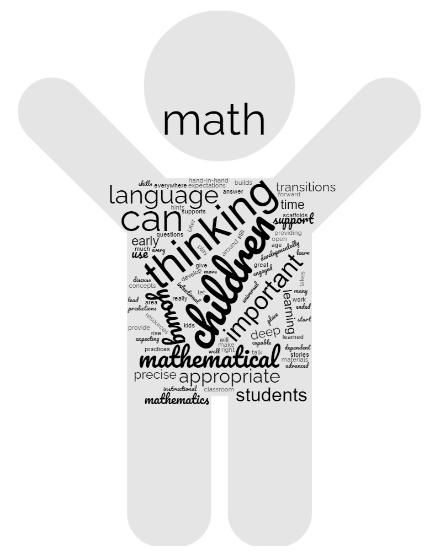A Foundation for Lifelong Learning
“The importance of starting children strong in mathematics cannot be overstated. Children’s growth in mathematical knowledge in kindergarten and first grade are an even stronger predictor of later mathematics, even into high school, than school entry knowledge.” (Catalyzing Change in Early Childhood and Elementary Mathematics 2020, 8)
Watch the following video from the Erickson Institute (1:40) to hear about the many ways in which early mathematics learning is BIG.
Professional Learning and Resources
Wisconsin educators participated in The Power of Early Mathematics, a 2023 professional learning opportunity that highlighted how powerful and deep early mathematics can be. Here is a word cloud of the big idea s created as part of the series.
s created as part of the series.
What do you notice? What do you wonder?
The following resources support the importance of early mathematics, finding math in everyday moments, and the richness and complexity of early mathematics:
-
WISELearn Resources - Search powerofearlymath (all one word) for teacher resources, including 4K High Quality Math Instructional Materials Guidance.
-
Why Early Math Matters - Article that highlights the importance of early math, connecting the Standards for Mathematical Practice with the kindergarten classroom.
-
Learning & Teaching with Learning Trajectories - Resources that follow natural developmental progressions in childrens’ thinking and learning about mathematics.
-
DREME Network - National collaborative early math learning and teaching research and resources. Wisconsin’s own Amy Claessens, Associate Professor, University of Wisconsin-Madison is a contributor and network member.
-
Erikson Institute - Early Math Collaborative - Big Ideas as core concepts of early mathematics. Check out the Online Learning tab for Professional Learning Modules.
-
Center For Research on Early Childhood Education (CRECE) - Wisconsin education research center focused on children ages 0-8, their families, and communities.
Expectations
Mathematics connection to the Wisconsin Model Early Learning Standards (WMELS) - Expectations from birth through entrance to first grade
Wisconsin Standards for Mathematics webpage - Grade level expectations, K-12
Subitizing: Moving Beyond Counting by Ones

Subitizing - knowing how many without counting - provides opportunities for children to think about quantities in ways that make sense to them. Subitizing supports students in reasoning with number relationships and flexible strategies, as they move from counting by ones toward both deep understanding and efficiency with number.


The benefits of subitizing are long-lasting. “Subitizing supports children’s development of number sense and operation sense; it engages children in decomposing and composing number as a basis for reasoning strategies with basic facts for addition, subtraction, multiplication, and division; and it lays the foundation for place value and meaningful operations with larger numbers” (Catalyzing Change 2020, 84).
The 2021 Wisconsin Standards for Mathematics formally include perceptual and conceptual subitizing. Definitions can be found in the glossary (Appendix 2) and content standard language can be found in kindergarten and grade 1. For additional information go to Subitizing at Learning & Teaching with Learning Trajectories or purposefully chosen, high-quality, standards-aligned instructional materials.
